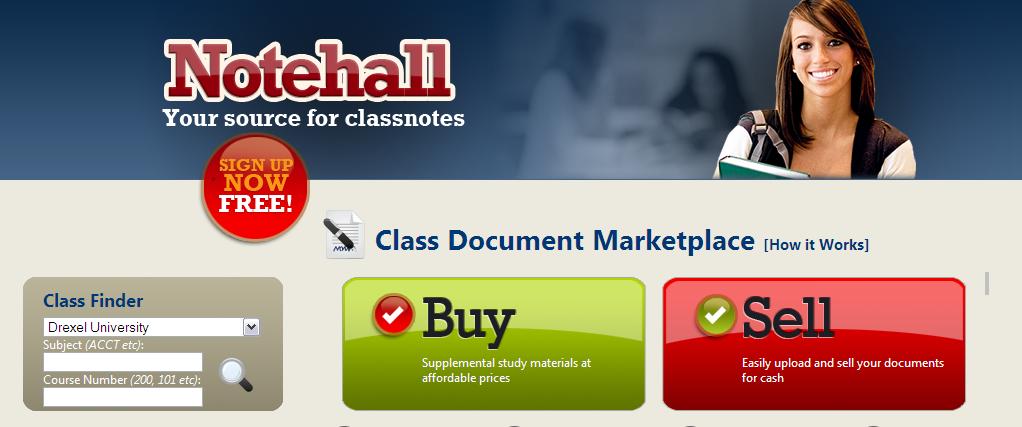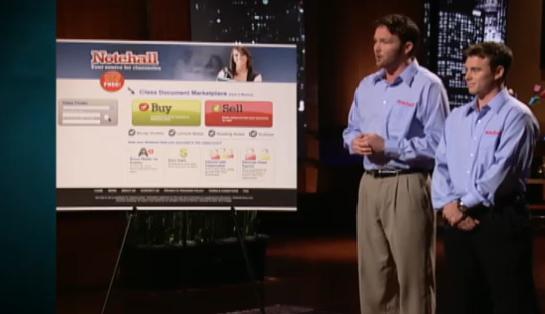The dining room is gone in this Manayunk rowhouse.
The living room, too, will soon be taken over by what will serve as desks and workstations for an expanding Web 2.0 startup that relocated from Arizona to the neighborhood in northwest Philadelphia that has attracted a steady stream of 20-something professionals for a decade or more now.

“This is home,” says Sean Conway, the 25-year-old co-founder and CEO of Notehall, an online marketplace for study exams, class notes and other supplemental academic material that is already at 15 colleges nationwide and is due to expand to as many as 65 more by the end of the academic year — 20 to 25 this semester and 30 to 40 in the spring.
Students upload their own documents and take a 40 percent commission when sold to their peers, who are allowed to peek at a third of the document before purchase.
Notehall now has seven employees, including five in Manayunk and two executive staff in Arizona, and is looking for more — including a PHP developer — most of whom are being financed by their own revenue, though some investment capital remains. Last month, they debuted their Penn State marketplace and, they’re already generating positive revenue there, “it’s just soaring,” Conway says, though he declined to disclose just how high.
But now they go to work, fighting to get attention among the growing crowd of Web-based startups calling for college-aged attention. They’ve had a good start.
Last night, Conway and his chief marketing officer DJ Stephan appeared on ABC’s Shark Tank, which puts entrepreneurs in front of five investors on national, prime time TV to field offers. In fitting reality TV, there was drama, but Notehall came away with another investor.
THE SHARKS
“We’ll make you $24 million in revenue in four years,” Conway told the five “sharks” he and Stephan faced on last night’s episode. “I’ll bet half my company on it.”
He didn’t have to do that.
In the end, Conway and Stephan agreed to a $90,000 investment offer from real estate magnate Barbara Corcoran, who would take a 25 percent stake in the business — though she offered to be bought out in six months time with 20 percent interest. That deal would value Notehall as a $360,000 business.
However, negotiations continued off camera, Stephan tells Technically Philly.
“Just know that the details of the deal have improved from the show,” he says.
The exposure of being put in front of between five to eight million national viewers didn’t hurt, as their site went down during the airing.
Other details emerged from the episode, which included plenty of camera shots of Manayunk, but no mention of Philadelphia by name. Conway told the investors that in the first eight months at the University of Arizona — where Notehall first launched — as much as 40 percent of the student body actively used their product. Conway also disclosed that they’ve done 5,900 credit card charges since their inception 18 months ago to bring in $30,000 in revenue.
“I have no doubt you have a home run hit with this,” Corcoran said on last night’s episode, after out-dueling two other of the “sharks” who expressed interest.
Watch a portion of last night’s Notehall segment below.
http://widgets.abc.go.com/o/48bda4baaf82f1d1/4acc9985f8f2081c/48bda4baaf82f1d1/c9d9eddd/-cpid/35bde1ae897d7ea0
GROWTH MOVING FORWARD
That’s why, Conway says, with needed investment settled and revenue growing, Notehall has to focus on attracting users.
“The big challenge is that this is a completely new concept to students. They want to know if it’s OK with the faculty, which we can assure them it is,” Conway, a San Diego native, says. “But it will make sense for them. Every college student is looking to make some money, and if they are already making the study guides and writing good notes, then uploading with us for the chance for some cash is a good move and has the added benefit of helping other students.”
Notehall doesn’t allow any copyrighted materials, including professors’ syllabi, tests, quizzes and other works created by others, Conway says, noting instead that students suffering from ADHD — like Conway himself — or struggling because of a language barrier can prosper. The company also benefits from its academic advisory board, highlighted by Wharton professor Leonard M. Lodish and Princeton academic Louis Padulo.
Justin Goldman of fellow DreamIt startup FanGamb, whom we recently profiled, showed Notehall’s D.J. Stephan an online application in June, having already generated revenue.
After applying, it took just an application, three phone interviews and a video before the team was given more pitch training, flown to Los Angeles the day of Demo Day and put on camera.
The business is clearly scalable, as more universities using the platform Notehall developers create reduces costs, he adds.
“So it’s not about how much each individual university makes because all together, eventually, it’s going to be a great business,” he says.
Only one regional school is included in that number so far: Big Five staple Drexel University. Though no time line was disclosed, Conway says the next Philadelphia school likely to get the Notehall treatment would be Temple, with Penn following and others coming in further waves of expansion.
THEIR BACKGROUND
Notehall is the natural merging of two heads.
Co-founder Justin Miller conceived the idea of trading school notes and study guides online, and Conway thought it could be a profitable business. Eighteen months ago they started merging those ideas, launching it at their native University of Arizona in Tucson. They gained some lumps in their first expansion to Arizona State and Kansas universities, but had grown in traffic by last spring semester, eying a summer in University City incubator DreamIt Ventures.

Conway couldn’t have much expected then that Philadelphia would take them from the sunny southwest. It came as a small cause of celebration that the Notehall team decided to move its headquarters to Manayunk, as announced publicly during DreamIt’s 2009 Demo Day in August. They were the only one of the dozen 2009 DreamIt companies without regional ties that chose to stay in Philadelphia.
“Philadelphia, in the underground almost, has one of the strongest communities for a technical startups of anywhere else in the country,” says Stephan, the company’s spokesman. “It’s a community trying to identify itself nationally, and we’re happy to be here for it.”
He cited Josh Kopelman and Gabe Weinberg as major influences here.
Below watch a Notehall promotional video from when they were still in sunny Arizona.
http://www.youtube.com/v/xSbYGJIvubM&hl=en&fs=1&
With investment and a welcoming big city community in a major market on the east coast, the Notehall team decided to base themselves in Philadelphia. Stephan guided Conway to Manayunk. After knowing the neighborhood for all of three days, Conway OK’d the move and joined his team in signing a lease.
And that’s how a Web 2.0 startup with national buzz took to living, working and playing in Manayunk, a Regional Rail ride away from Center City.
“I’m standing on my balcony… overlooking a valley with a perfect mix of professionalism and outdoor beauty,” says Conway, who adds he’s a bicyclist and has to fit his neighborhood-intramural soccer and volleyball games in with Web-entrepreneur schedule. “The computer is the only thing keeping us inside.”
“We want to make entrepreneurial connections here with people who are just as ambitious as we are,” he says. “We are here to make lifelong relationships.”
-30-
Every Wednesday, Shop Talk shows you what goes into a tech product, organization or business in the Philadelphia region. See others here.







